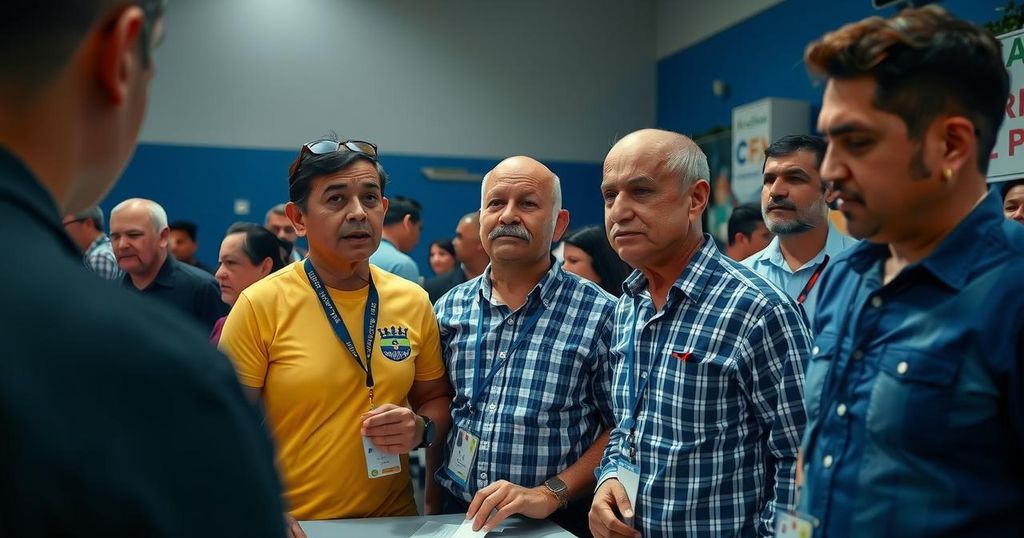World news
2024 ELECTIONS, ARGENTINA, ASIA, BRAZIL, BRICS, COLORADO PARTY, CUBA, DELGADO, ELECTION, ELECTIONS, FRENTE AMPLIO, JOSE “ PEPE, LUIS LACALLE POU, MEXICO, MUJICA, NATIONAL PARTY, NORTH AMERICA, OR, PHILIPPINES, PRESIDENTIAL ELECTION, SOUTH AMERICA, TRADE RELATIONS, URUGUAY, VENEZUELA, VOTER TURNOUT
Aisha Khan
0 Comments
Uruguay’s Presidential Runoff: Leftist Frente Amplio Faces Right-Wing Opposition
Uruguayans are voting in a pivotal presidential runoff between leftist candidate Yamandu Orsi and right-wing Alvaro Delgado, amid closely contested results. Orsi aims to return the left to power after five years of right-wing governance, while Delgado capitalizes on the popularity of the current administration. Polls suggest a tight race, with both candidates needing to attract undecided voters.
Uruguay is hosting a crucial presidential runoff election in which voters must choose between the leftist Frente Amplio (Broad Front) candidate Yamandu Orsi and Alvaro Delgado of the National Party, who is supported by the outgoing President Luis Lacalle Pou’s center-right coalition. Polling stations opened at 8 AM local time, with initial results anticipated shortly after closing at 7:30 PM. The outcome is expected to be closely contested, with indications that less than 25,000 votes could separate the two frontrunners.
The election comes five years after the right-wing government took power, with former leftist President Jose “Pepe” Mujica’s coalition looking to regain its influence. Orsi, representing the Broad Front, previously garnered 43.9 percent of the vote in the first round, aiming to appeal to voters from unaligned parties and those who abstained previously. Conversely, Delgado, who secured 26.8 percent, is banking on the popularity of the current administration, despite the conservative coalition’s challenges with rising crime rates.
In contrast with the heightened political divides in neighboring countries, Uruguay’s political climate remains largely cooperative, with candidates attempting to attract votes without committing to major policy changes. Orsi emphasizes his moderate approach, while Delgado urges voters to maintain continuity with a government perceived positively by many. As election day unfolds, the significant question remains whether Uruguay will continue a global trend where incumbent parties face declining electoral support amid economic challenges.
The context of this election is steeped in a backdrop of political stability compared to other Latin American nations, where sharp divisions often dictate electoral outcomes. Uruguay’s relatively calm political climate has fostered an environment where both conservative and liberal coalitions coexist with less polarization. Former President Jose Mujica’s leftist bloc has been seeking to regain power after a tenure characterized by right-wing leadership, illustrated by the conservative coalition’s difficulties in addressing public concerns such as crime and inflation. With a population of approximately 3.4 million, the decisions made in this election are critical in shaping the future course of national policy.
In summary, the Uruguayan presidential runoff presents a significant moment for the nation as voters choose between the leftist Frente Amplio’s Yamandu Orsi and Alvaro Delgado from the National Party. The election reflects a delicate balance of power and public sentiment, particularly regarding pressing issues like crime and economic conditions. With less than 25,000 votes potentially separating the candidates, the outcome remains uncertain, emphasizing the importance of addressing the concerns of unaligned voters as well as those who previously abstained.
Original Source: www.aljazeera.com




Post Comment